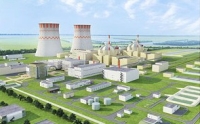Reactor vendors can increase their competitiveness as they bid for projects in the post-Fukushima world if they address a number of key factors to bring together their strengths and good practices, a new report from Ernst & Young suggests.
 |
| Turkey's planned Akkuyu plant: an example of a vendor offering extended services (Image: AEP) |
The report, Benchmarking the Global Nuclear Industry 2012, is based on a series of 50 interviews with high-level representatives from the nuclear industry from which Ernst & Young has synthesised a 50-page report providing an overview of the effects of Fukushima for the nuclear industry and suggesting how vendors can position themselves for maximum effect. Those interviewed included representatives of reactor vendors, utilities, nuclear and conventional island equipment manufacturers, national regulatory authorities, international agencies and scientific experts.
The events of March 2011 have not had a major impact on the nuclear industry, the report notes. Indeed, the biggest legacy of the accident to the nuclear industry appears to be a renewed focus on safety, with international regulation expected to become more stringent. The individual positions of the players in the nuclear industry vary markedly depending on their own location and circumstances, and against this background buyers are expecting to reap more benefits from their suppliers. The report suggests that vendors look to a set of ten "key success factors" to help them increase their chances of securing orders.
Cost is still a determining factor for reactor buyers. Vendors who can access cheap raw materials or exploit smart design to make the most of resources, access low labour costs and make the most of large manufacturing capabilities can expect to gain advantage. Vendors that can help clients to raise the funds needed to finance a nuclear plant are also at a distinct advantage, the report notes. But reputation is also important, the report finds: with strong safety parameters a common theme in all nuclear reactor bids, an excellent track record and extensive experience is highly valued in a reactor vendor.
World-leading technology, supported by investment in development and innovation, also inspires buyer confidence. But that is not to say that only tried-and-trusted designs are likely to win contracts. Another key success factor for a vendor is to be able to offer a broad range of solutions including small reactors. These, the report says, could better address the needs of many newer nuclear clients, especially in emerging nuclear countries.
For international advantage, vendors need strong governmental support which makes the export of nuclear plant a national priority, and will also be at an advantage if they can establish a local office in the buyer's country. Commitment to establishing and maintaining a nuclear workforce, for example through collaborations with research institutes, is also seen as vital, while vendors can also help strengthen their position by assisting with public communications to secure support for nuclear projects. Localisation and a willingness to transfer technology and knowledge also help vendors to build a competitive advantage.
The report notes the lengths that vendors are prepared to go to in order to please buyers and secure contracts, with vendors willing to take on not just construction but also the operation of a plant, such as Turkey's Akkuyu plant, which is to be built, owned and operated by Russian companies. Both vendors and buyers interviewed for the report expressed some concern that this trend could potentially lead to a "paradoxical" situation with a client asking a vendor to take over complete responsibility for their nuclear program, an "inefficient and unsustainable" scenario given the complexity and safety issues related to running a power plant. A strong local regulator is therefore crucial to ensure that governments do not shirk their responsibility towards the nuclear power plants in their country.
Researched and written
by World Nuclear News






_15863.jpg)







